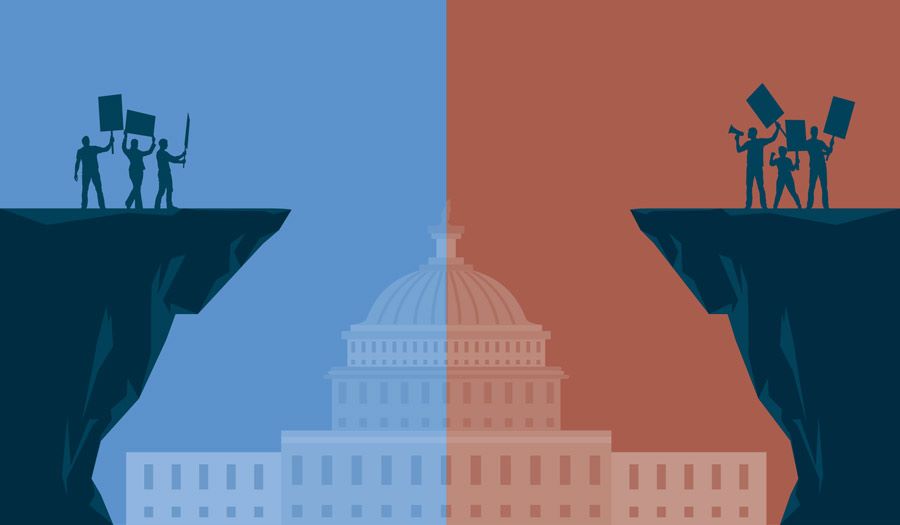A Dance of Division, Hypocrisy, and Ideological Narcissism
In an era that calls for unity and action, political division, hypocrisy, and an intriguing phenomenon known as ideological narcissism, seem to grip the political landscape. Politicians make towering promises – eradicating poverty, housing the homeless, ensuring livable wages, taxing the wealthy – only for these pledges to remain unrealized. What’s astonishing is how deftly blame is shifted to opponents, while accountability evaporates into thin air. This article delves into the intricate web of political blame-shifting, and how ideological narcissism perpetuates this culture, stalling progress.
The Perennial Promises:
For over sixty years, campaigns have been punctuated with promises aimed at societal well-being. However, many of these promises remain just that – promises. Many politicians focus more on retaining power than enacting meaningful reforms. When their tenure yields little progress, they cunningly point fingers at the opposition, absolving themselves of responsibility.
When Blame Becomes the Norm:
In most professions, failure to deliver results coupled with perpetual blame of others would lead to repercussions. However, in politics, this has become an art form. The capacity to blame others has almost become a prerequisite for political survival. This dynamic breeds stagnation and division, as essential reforms are caught in the crossfire of political finger-pointing.
Ideological Narcissism – The Linchpin:
One might wonder why constituents allow this cycle to continue. This is where ideological narcissism comes into play. It is characterized by an unwavering belief in the moral superiority of one’s political ideals, coupled with a vilification of opposing viewpoints. This narcissism is often fueled by politicians who portray themselves as the saviors from the ‘dangerous’ opposition.
The Fear Factor and Cult-Like Allegiance:
A significant tool in the arsenal of ideological narcissism is fear. Politicians often paint grim pictures of what would happen if the other party gains power. This fear mongering conditions voters into a state of alarm, where they perceive any alternative to their chosen party as an existential threat. The electorate, under the siege of fear, aligns itself with their party’s rhetoric in a cult-like manner, without questioning the lack of progress on promised reforms.
The Moral High Ground Mirage:
Central to ideological narcissism is the belief in holding the moral high ground. Each side of the political spectrum is convinced that their ideology is superior. This moral posturing makes compromise or even dialogue exceedingly difficult. When constituents are conditioned to believe that their side is morally supreme, they are less likely to demand accountability from their representatives, as they view them as the ‘lesser of two evils.’
Breaking the Chains of Division and Narcissism:
To break free from this stifling cycle, it is imperative to recognize the dangers of ideological narcissism and the culture of blame. Constituents must demand accountability and transparency from their representatives, regardless of party affiliation.
Encouraging critical thinking and open dialogue is essential. Individuals must be willing to question their own beliefs and consider different perspectives. This is not about abandoning one’s values but recognizing that no single ideology holds a monopoly on truth or morality.
Educational initiatives that foster an understanding of the complexities of governance, and the importance of collaboration, could also be beneficial. Such education can equip voters to critically assess political rhetoric and make more informed decisions.
Moreover, the media plays a significant role. A more responsible media that focuses on facts over sensationalism can help in presenting a balanced view, which is essential in breaking the spell of ideological narcissism.

Policy Paralysis: The Cost of the Blame Game
The consequences of the blame game and ideological narcissism are significant and far-reaching. Essential reforms that can improve millions of lives are often sidelined in favor of political posturing. This results in policy paralysis, where despite the urgent need for change, progress is slowed or halted due to political disagreements.
Case Studies: A Closer Look
Consider the issue of housing the homeless, a promise echoing in political rallies for decades. Yet, homelessness remains a glaring issue. Politicians often argue about methodologies, funding, and potential repercussions, blaming one another for policy failure while the problem persists.
Or take the matter of providing a livable wage. Despite consensus among economists on its potential benefits, the progress is lethargic at best. The debate gets mired in ideological battles about market dynamics and the role of government, with each side claiming moral and intellectual superiority.
The Call for Electoral Reforms
Electoral reforms can serve as a valuable tool in fostering accountability. Implementing measures like tracking of campaign promises and actions taken by elected officials can promote transparency. By holding politicians accountable for their promises, constituents can break free from the cycle of empty rhetoric and deferred action.
The Power of the Informed Electorate
Ultimately, the power to break this cycle lies with the electorate. An informed and critically thinking electorate can see beyond fear-based rhetoric and demand action. When voters are willing to question their leaders, to engage in open dialogue with those of opposing views, and to demand accountability, real change can begin to occur.
Conclusion:
The intertwined issues of political division, hypocrisy, ideological narcissism, and the culture of blame create a complex knot that hinders progress. However, by acknowledging these issues, encouraging open dialogue, advocating for electoral reforms, and fostering an informed electorate, it is possible to untangle this knot.
In the end, it is important to remember that politicians are public servants, meant to serve the best interests of the public. If they fall short, it is our responsibility as constituents to hold them accountable.
What are your thought?
We would love to hear your thoughts on this issue. Have you noticed the impact of the blame game and ideological narcissism in your own political environment? What steps do you think can help combat this issue? Let’s foster an open dialogue and work towards a more accountable and effective political system.

0 Comments